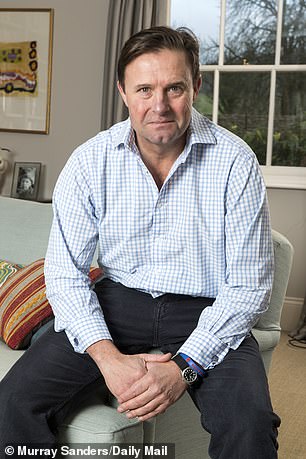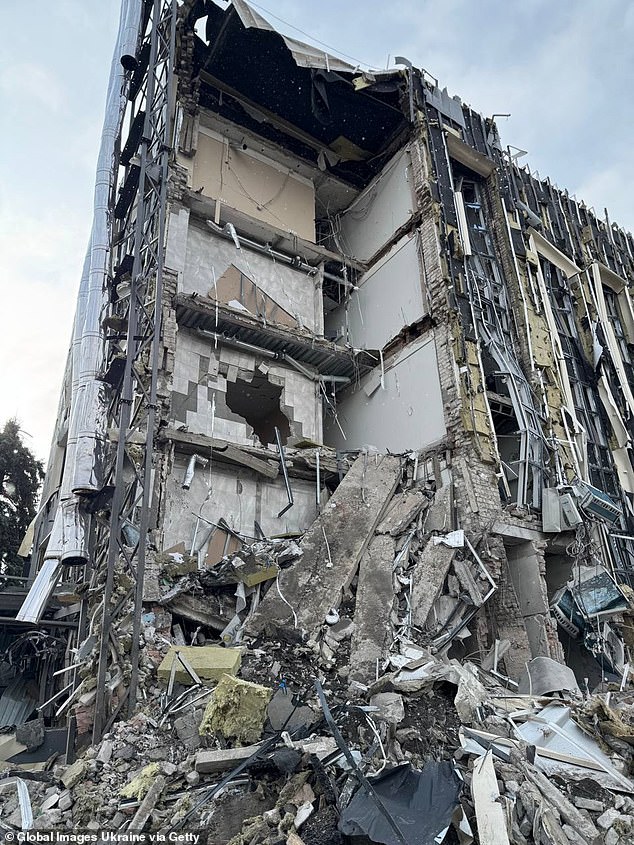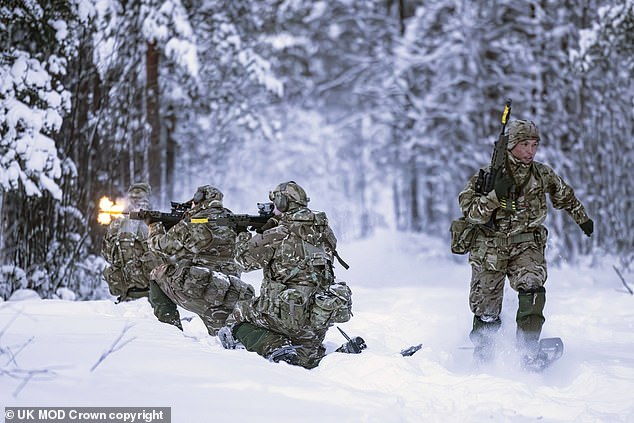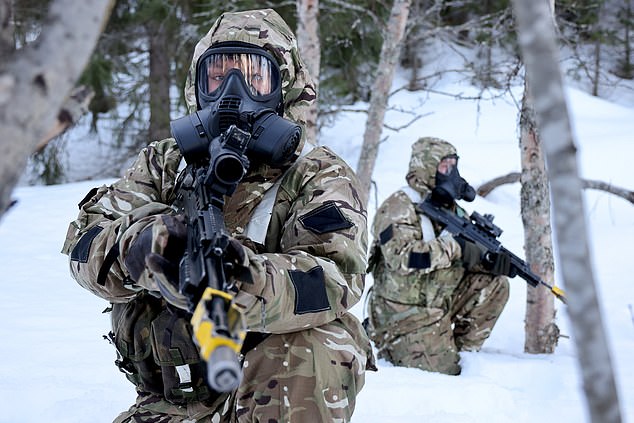Britain’s shrunken army would be almost completely swallowed up if it had to enforce Donald Trump‘s reported Ukrainian ‘peace plan’ deal, a defence chief has warned.
Colonel Hamish de Bretton-Gordon said tens of thousands of British soldiers could be sucked into spearheading a peacekeeping force to oversee a demilitarised zone spanning an 800-mile long stretch of contested Ukrainian land seized by Russia.
It comes after an unconfirmed ‘leaked report’ claimed to reveal President Trump’s plan for a ceasefire by Easter, freezing any further advance towards Kyiv by Russian tyrant Vladimir Putin‘s forces.
To police the peace pact, a brigade of 10,000 UK military personnel would be needed, Col de Bretton-Gordon said, alongside potentially two other similarly-sized units that could rotate and deploy every six months.
But the former commander of Britain’s nuclear defence force feared such a huge commitment would bog down a major bulk of the army, leaving the Royal Navy and RAF – which also face their own manpower issues – to defend Britain’s shores.
And he was concerned that the UK was so short of tanks, armoured vehicles and helicopters, that the army would need to rely on Nato allies like Sweden, Denmark, France and Germany to do the heavy lifting on the ground.
‘This would be a complete commitment for the British Army,’ warned the retired tank commander. ‘On this scale, this would swallow up the whole force.
‘We could probably do a brigade at a time. But one British brigade would not be enough to cover that border. This is divisional corps level effort – ballpark, that’s 50,000 to 60,000 peacekeeping troops.’


The Afghanistan veteran said it would be ‘essential’ to have Nato allies supporting the mission, adding: ‘We just don’t have the tanks, armoured vehicles and attack helicopters needed to cover such a large area.’
Under the alleged leaked Trump peace plan, shared on a pro-Russian site, a ceasefire would be agreed on April 20.
The proposal also claims there would be a ban on Ukraine from joining Nato, and a demand for Kyiv to accept Russian sovereignty on annexed land.

British defence sources have told the MailOnline the ceasefire proposal is ‘purely speculative’.
However, the ‘plans’ – which have not been confirmed by the Washington – have left Ukrainians horrified and fearing Kyiv might have to cave and back unfavourable terms to end the war, which will hit its third anniversary on February 24.
Meanwhile, reports today suggest that President Trump is preparing to double down on sanctions against Russia to bring Putin’s barbaric invasion of Ukraine to an end.
Current sanctions against the Russian premier are ‘only about a three’ on a one-to-10 scale of how severe they could be, according to president’s special envoy on the Russia-Ukraine conflict, Keith Kellogg.
‘The pressure just can’t be military. You have to put economic pressure, you have to put diplomatic pressure,’ he told the New York Post. ‘And if there’s anybody who understands leverage, it’s President Donald J. Trump.’




However, despite this, there are concerns that America would not use any of its forces to aid in the peacekeeping mission.
Britain’s army is now at its smallest size in more than 230 years, with Defence Secretary Jon Healey recently warning that it could soon dip below 70,000 soldiers for the first time since 1793.
So depleted is the UK’s military manpower, former UK commanders have said the nation would struggle to field the thousands of troops needed to keep the peace.
General Lord Richard Dannatt, told The i Paper last month: ‘I don’t think the size of our Army is large enough to do that with everything else that it’s doing currently. I think we would struggle.
‘We could do it, but then we would have to certainly put more resources into the Army, and set about growing the size of the Army.
‘It’s a major issue that relates directly to the future size of the British Army. You start to run out of troops quite quickly.’
Col de Brettton-Gordon added Britain could still play a key part in the peacekeeping effort, acting as a ‘framework’ force, leading a tactical and operational command HQ.
‘British troops are ideal for this, it’s what they’re trained for: hearts and minds, doing the peacekeeping stuff and then being able to rapidly enforce things when it’s needed,’ he told MailOnline.


‘But if the government wants to use its military, it has to resource it properly and spend the right money. Apart from one battlegroup in Estonia, there’s not much else that’s ready and trained.
‘If Starmer wants to wave the military card, he has to pay for it.’
Col de Bretton-Gordon also claimed it would be unlikely that Washington would put American boots on the ground.
‘The US won’t be getting involved. Trump has said “Europe is your problem”. So, the assumption is the US wouldn’t be getting involved.
‘But if the s*** hits the fan, then the Americans might come charging over the hill but I get the feeling that what Trump has told us is “I will squeeze Putin’s cajones tightly but you have to put the boots on the ground”.’
Sir Keir Starmer has previously spoken to French President Emmanuel Macron about the prospect of a Franco-British joint peacekeeping in Ukraine once the war is over, to prevent another onslaught by Russia.
Speaking last month, the Prime Minister added: ‘We are with you not just today or tomorrow, for this year or the next, but for 100 years long after this terrible war is over and Ukraine is free and thriving once again.’
Asked whether he was ready to send the British troops to Ukraine, the PM said: ‘I don’t want to get ahead of ourselves, but I have indicated that we will play our full part. Because this isn’t just about sovereignty in Ukraine.
‘It’s about what the impact is back in the United Kingdom and our values, our freedom, our democracy. Because if Russia succeeds in this aggression, it will impact all of us for a very, very long time.’
The Ministry of Defence declined to comment.
